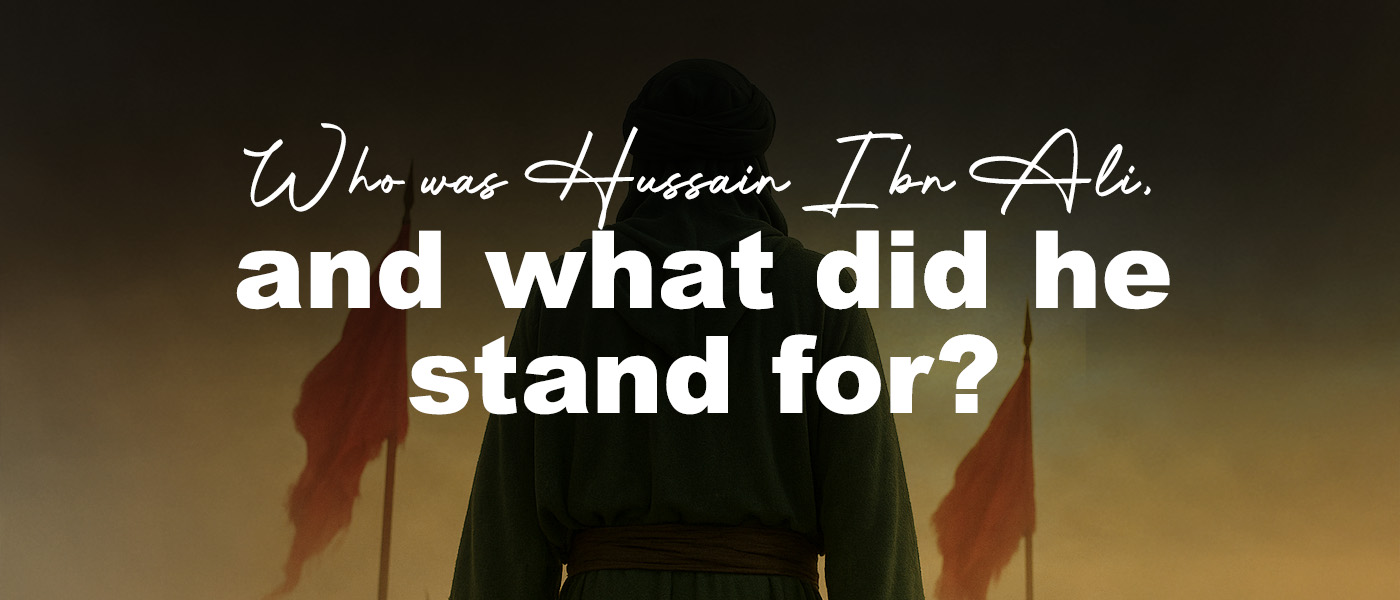In the history of Islam, there are some personalities that stand out like shining stars among the vast record of historical events, powerful sermons, and figures that have made our religion what it is today. Their contributions are so powerful that they are often brought into conversation frequently because of the modern day connections that can be made. Their stories are ones that even have non Muslims pausing to listen, ask questions, and become enlightened. Their words are heartbreaking but so touching, providing a balm to a wounded heart in times of vulnerability. Their courage is commendable as it reminds us, as Muslims, never to falter from siraat al-mustaqeem, even when the end to difficulties seems like it’s nowhere in sight. These personalities are not only recognized for their great family background, but because of their characters, sacrifices, and upheld values. One such individual who continues to be remembered 1,447 years later is Hussain ibn Ali (RA).
He was the beloved grandson of Prophet Muhammad (SAW), and the youngest son of Ali ibn Abu Talib (RA) and Lady Fatima bint Muhammad (RA). While already held in the highest regard for being a descendant of such excellent personalities, it was Hussain ibn Ali’s (RA) stand for truth and justice during the tragic event of Karbala that made him one of the most revered and remembered figures in Islamic history.
For Muslims around the world, Hussain ibn Ali (RA) represents moral courage, sacrifice, and unshakeable faith – something that we must all espouse in ourselves as the trials and tribulations, globally, continue to grow.
Hussain ibn Ali (RA) was born just a few years after the migration to Madinah. From a young age, he was loved deeply by the Prophet (SAW) who would often carry him and his brother, Hasan ibn Ali (RA), on his shoulders and openly show affection for them in public. While these are documented tender family moments, they were also a means for the Prophet (SAW) to show the Ummah the special role these two brothers would one day play in the history of Islam.
The Prophet (SAW) has lovingly said, “Hussain is from me, and I am from Hussain.” (Tirmidhi)
This hadith reminds us that to remember, love, and honor Hussain ibn Ali (RA) is to also remember, love, and honor our Prophet (SAW).
Hussain ibn Ali (RA) grew up in the golden age of Islam under the guidance of the Prophet (SAW), and then under the leadership of the four caliphs of Islam. He learned not only outer practices of Islam but the tremendous values upon which our faith stands, including patience, mercy, standing up for truth, and caring/giving back to communities. He witnessed times of peace and periods of great political tension. But, through it all, he remained committed to the path of Allah (SWT) and the Prophet (SAW) because he always spoke the truth, he stood up for what is right, and made decisions that would avoid conflict.
After the passing of his brother, Hussain ibn Ali (RA) was met with a significant trial that would change Islamic history completely. When the son of Muawiyah ibn Abu Sufyan, Yazid ibn Muawiyah rose to power, Hussain ibn Ali (RA) was told to pledge his loyalty to him. However, Yazid ibn Muawiyah’s leadership was seen as antithetical to the moral teachings of Islam. For Hussain ibn Ali (RA), pledging his loyalty to someone he believed was unjust would be a betrayal of the mission of the Prophet (SAW).
He did not wish to usurp power for himself. Instead, he said, “I have not risen to cause trouble or seek power. I only want to bring reform to the community of my grandfather (SAW). I want to encourage what is right and forbid what is wrong.” He believed it was not only his duty, but his obligation, to take a stand – even if it meant losing everything that he held so dear.
In 61 AH, Hussain ibn Ali (RA) set out with his family and a small group of companions toward Kufa, a city where people had invited him for leadership. But, before reaching there, he was instructed to detour towards a desert known as Karbala. There, on the 10th of Muharram, Hussain ibn Ali (RA) and his caravan – including family, companions, and small children – were surrounded. They were denied water for several days. One by one, his companions and family members were killed. Even his six-month-old infant son was struck.
Despite the unfathomable hardship, Hussain ibn Ali (RA) refused to give in. He prayed to Allah (SWT). He comforted his remaining family members and urged them to have tawakkul and sabr. He reminded the enemies about the mercy and justice of Allah (SWT). And, when the time came, without hesitation, Hussain ibn Ali (RA) gave up his life for the principles and values of his grandfather’s (SAW) religion.
This tragic event in Islamic history has many great lessons upon which all Muslims must reflect. The biggest one is that it is better to die with dignity than to live with humiliation. Condemning injustice does not mean assigning blame to all individuals involved; Islam teaches us to be just in our judgment and always return matters to Allah (SWT).
Here are some more lessons that we can implement in our everyday lives to become the best of believers:
- Always stand up for what is right: Even when you’re outnumbered, even when it’s risky, stand up for what is just and true. Hussain ibn Ali (RA) teaches us that it’s better to die with dignity than to live a life being a bystander to injustice.
- Don’t ever compromise your values: Hussain ibn Ali (RA) didn’t go to Karbala because he wanted power. He went because he could not support a system that went against the teachings of Islam. That same passion and courage should live within us today – whether it is in our workplaces, families, communities, or society.
- Trust in Allah (SWT) alone: Despite the thirst, the pain, and the loss, Hussian ibn Ali (RA) never gave up on Allah (SWT). He kept praying until the very end. His trust in Allah (SWT) was unshakeable, even when everything else was taken from him.
Hussain ibn Ali (RA) gave up his life, the lives of his children, youth, and elderly to save the soul of our deen. His sacrifices should make us reflect on how much we give up just to please our Lord. How do we live by the truth in our own lives? How do we respond to injustice, even in the smallest way? How much do we trust Allah (SWT) when things get difficult?
Hussain ibn Ali (RA) stood alone in Karbala, but his message continues to stand with every Muslim who chooses faith over fear, truth over silence, and principle over popularity. While Sunni scholars have differed in their opinions regarding the political events following the Khilafah, the reverence for Hussain ibn Ali (RA) remains universal across the Muslim Ummah.
Oh Allah (SWT), grant us the strength to follow his example, and the courage to stand for the truth as he stood. Bless us with patience and firmness in times of trial, and make us among those whom You love, and whom the Prophet (SAW) loves. Ameen!



